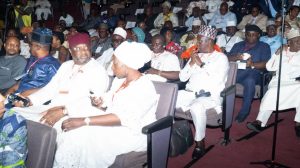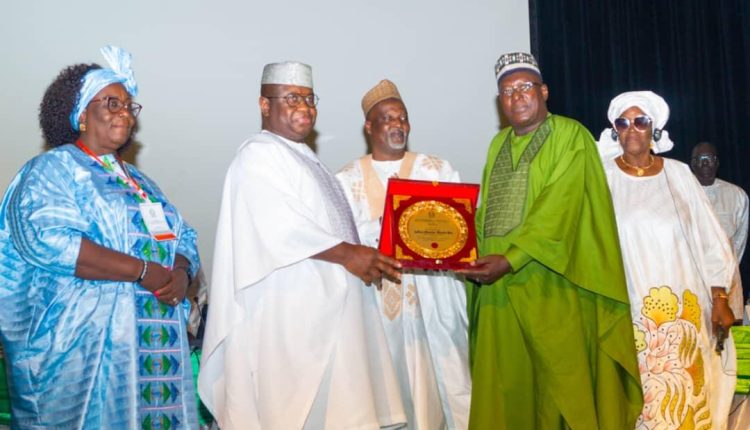The President of the Republic of Sierra Leone, Dr Julius Maada Bio said Illegal Mining and trafficking in precious minerals has negatively impacted peace, stability, security, development, governance, the rule of law, the environment and the economy of West Africa.
President Bio stated this at the opening of an ongoing meeting by ECOWAS Parliament, the last for the fifth Legislature under Speaker Sidie Mohamed Tunis.
President Maada Bio said, the region has contended with illegal mining even before the nation’s gained their independence.
“Therefore, I thank the ECOWAS Parliament for organizing this workshop, which underscores the importance of collective action in addressing challenges that transcends borders,” he said.
President Bio lamented that the African continent possesses over 60 different types of minerals, accounting for a third of the world’s mineral reserves.
“ECOWAS Region is richly endowed with abundant reserves of a large variety of non- renewable natural resources comprising mineral resources ( including gold, uranium, bauxite, iron ore, diamonds, phosphate and manganese), crude oil and natural gas.”
He observed that illegal mining of precious minerals is often accompanied by serious human rights abuses and can have several environmental impacts, including deforestation, land degradation and pollution.
“Illegal Mining and trafficking of precious minerals are often linked to economic crimes, such as task evasion, fraud and corruption, by exploiting loopholes in regulatory frameworks,” he told the meeting.
According to him, due to the high profits associated with precious minerals and the often-low risk of being arrested or prosecuted, organized criminal groups are exploiting this sector.
President Maada Bio challenged the parliamentarians to come up with resounding conclusions that would contribute Immensely towards addressing the unacceptable poverty levels in the Region through the proper exploitation of our richly endowed mineral resources for the benefit of all.
He also used the occasion to commend the outgoing Speaker of the ECOWAS Parliament, the Right Honourable Dr Sidie Mohamed Tunis, as an accomplished businessman, politician and an experience law marker.
The outgoing Speaker of the ECOWAS Parliament, Mohamed Tunis in his opening remarks at the seminar also expressed concern over the implication of illegal mining on the region’s economy, security, and environment.
Dr Tunis stressed that the threat of illegal mining in the ECOWAS Region is having far-reaching implications on the fabric of the region.
He stressed that the complex interplay of security,social-economic dividends, and environmental impact on the soil and waters, have emerged as pressing concerns that demand immediate investigation and finding sustainable solutions.
Dr Tunis said the situation has necessitated the need for the community to pay more attention to the mining sector.
Citing the situation in Nigeria, the outgoing Speaker said, that nearly 80% of mining in northwest Nigeria is being carried out illegally, which has increased conflict since 2014, spreading across Kaduna, Katsina, Kebbi, and Zamfara states.
The Speaker further explained that the Community is only raking in a meagre sum from the sector despite the huge potential.
With reference to the contribution of the mining sector to the GDP of some Member States, Tunis said, the ECOWAS Vision 2050 document indicates that Ghana benefits 7.5%, Burkina Faso 10.2%, Ivory Coast 4%, while Nigeria receives only 9%.
He further said, that with a properly regulated mining sector, various economies would be far more impactful.
The threat of illegal mining in the ECOWAS region is having far-reaching implications on the security, socio-economic environmental fabric of the region.
Despite the potential of the mining sector to positively impact the lives of community citizens, the complex interplay of security, social-economic dividends, and environmental impacts on the soil and waters have emerged as pressing concerns that demand immediate investigation and finding sustainable solutions.
“A careful revision of the numbers available to us provides a compelling need to give attention to the region’s mining sector. As an example, nearly 80% of mining in Northwest Nigeria is being carried out illegally, which has increased conflict since 2014, spreading across Kaduna, Katsina, Kebbi and Zamfara States.
“Referring to the contribution of the mining sector to the GDP of some Member States, the ECOWAS Vision 2050 document indicates that Ghana benefits 7.5%, Burkina Faso 10.2%, Cote d’Ivoire 4%, while Nigeria receives only 9%. With a properly regulated mining sector in the region, it is expected that our various economies would be far more impactful.
“Furthermore, illegal mining of precious minerals in West Africa has succeeded in not only depriving Member States of much-needed revenue to grow their economies through improved GDP but has also created instances of instability through banditry, kidnapping, thuggery, and in some cases insurgency.”
He therefore said the Seminar is part of the efforts of the regional Parliament to examine the implications of illegal mining in the region.

“Therefore, to examine the phenomenon of illegal mining, as well as its socio-economic, security, and environmental implications on the advancement of Member States, the leadership of the Parliament found it befitting to dedicate the last Parliamentary Seminar of the Fifth Legislature to the topic.
“We expect that at the end of the seminar, we will have a greater appreciation of the regional mining frameworks and challenges to their implementation and make recommendations where regional collaboration can be fostered to boost the sector.”
Hauwa M.


Comments are closed.